📋 Group Discussion (GD) Analysis Guide
🌟 Topic: Can Emotional Intelligence Drive Better Management Practices?
🌐 Introduction to Emotional Intelligence in Management
Opening Context: “In a world where technical skills are no longer sufficient, emotional intelligence (EI) has emerged as a critical factor in effective management and leadership, influencing team performance, decision-making, and organizational success.”
Topic Background: First introduced by psychologist Daniel Goleman in the 1990s, EI refers to the ability to identify, understand, and manage emotions. Studies show that managers with high EI create collaborative workplaces, reduce stress, and enhance productivity. In today’s dynamic corporate environment, organizations increasingly prioritize emotional intelligence in leadership roles.
📊 Quick Facts and Key Statistics
- 90% of top performers possess high emotional intelligence (TalentSmart, 2023).
- Companies led by emotionally intelligent leaders report 20% higher employee engagement (Harvard Business Review, 2023).
- Emotional intelligence accounts for up to 58% of a leader’s success (Forbes, 2023).
- Teams with emotionally intelligent managers demonstrate 31% higher productivity (Gallup, 2023).
👥 Stakeholders and Their Roles
- Corporate Leaders: Integrate EI principles to foster collaboration and innovation.
- Employees: Benefit from supportive work environments that reduce burnout and stress.
- HR Departments: Incorporate EI assessments in hiring and leadership training.
- B-Schools: Prepare students for managerial roles by integrating EI in curricula.
📈 Achievements and Challenges
🎯 Achievements:
- Better Leadership Outcomes: Leaders with high EI inspire teams and increase retention.
- Conflict Resolution: Managers with EI resolve disputes effectively, creating harmony.
- Improved Communication: EI enhances clarity, empathy, and responsiveness in team interactions.
- Higher Resilience: Emotionally intelligent managers foster adaptability and motivation during crises.
⚠️ Challenges:
- Measuring EI: Unlike IQ, emotional intelligence is subjective and difficult to quantify.
- Cultural Bias: EI traits may differ across cultures, impacting global management practices.
- Overreliance: Focusing solely on EI can neglect technical or strategic skills.
🌍 Global Comparisons
- United States: Companies like Google and Microsoft integrate EI training to improve innovation and teamwork.
- Japan: Emphasis on harmony (wa) aligns with EI principles, fostering cohesive workspaces.
📚 Case Study
PepsiCo: Former CEO Indra Nooyi emphasized emotional intelligence, resulting in stronger leadership and company growth.
📝 Structured Arguments for Discussion
- Supporting Stance: “Emotional intelligence drives better management by improving leadership, communication, and team performance.”
- Opposing Stance: “While beneficial, EI alone cannot replace technical expertise, decision-making, or strategic vision.”
- Balanced Perspective: “Emotional intelligence complements technical skills, creating holistic leadership essential for modern management practices.”
📖 Effective Discussion Approaches
Opening Approaches:
- Data-Driven: “Studies show 90% of high-performing leaders have high emotional intelligence, proving its role in effective management.”
- Case Study: “Indra Nooyi’s success at PepsiCo highlights how EI can transform leadership.”
Counter-Argument Handling:
- Rebuttal: “While leadership programs have limitations, data demonstrates their tangible benefits in fostering career growth.”
📋 Strategic Analysis of Strengths and Weaknesses
- Strengths: Enhances collaboration, leadership, and conflict resolution.
- Weaknesses: Difficult to measure and standardize.
- Opportunities: Increasing use of EI tools in leadership training.
- Threats: Risk of overemphasis leading to neglect of technical expertise.
🎓 Connecting with B-School Applications
Real-World Applications:
- EI principles are vital in human resource management, project leadership, and team-building exercises.
Sample Interview Questions:
- “How does emotional intelligence differentiate an effective leader from an average one?”
- “What role does EI play in conflict management and team performance?”
Insights for B-School Students:
- Integrating EI into leadership styles enhances adaptability and people management skills in diverse corporate settings.


